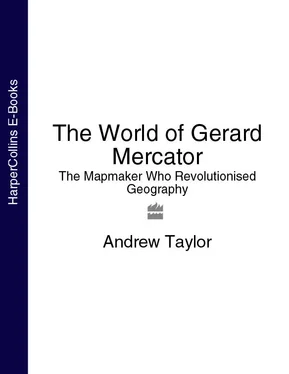He worked alone but turned to Gemma for help and advice whenever he found himself puzzled by Euclid. In a mark of singular favor, he was invited for private tuition in Gemma’s house as one of the familia of students who sat at his feet. Gemma’s scholarship had won him the regard and friendship of Johann Flaxbinder, the ambassador of the king of Poland to the court of Charles V, and Flaxbinder had tried unsuccessfully to persuade him to leave the lowlands for a post as Polish court cosmographer. The books he published, which supported him during his years at Leuven, were dedicated to such figures as Charles’s advisers Maximilian Transylvain and Jean Obernburger, and to Jean Khreutter, a senior councillor to the queen of Hungary. The emperor himself summoned Gemma to his court in Brussels on occasion for discussions on matters of science and geography. Gemma Frisius was Mercator’s first introduction to the eminent circles on whose support his prosperity would be built.
His influence over the young student went farther. Euclid was entirely theoretical – the study of logical argument as much as lines, triangles, and circles – but Mercator’s interest, like that of Gemma, was engaged from the start in its practical use. “In geometry, I only pursued those studies that were to do with measuring, the location of places, the laying out of maps, the dimensions of territories, and finding the distances and sizes of celestial bodies,” he reminisced when he was sixty-nine years old in a letter to a Swiss Protestant pastor, offering advice on how a child might be taught geometry. “In mathematics, I directed my studies to cosmography alone.” 7His aim throughout was to improve his skills as a geographer, surveyor, cartographer, and astronomer.
He had other interests as well – interests that went far beyond the apparently innocent theories of geometry and took him into areas on which Aristotle and the Church had laid down unshakable rules. Ever since his boyhood in Rupelmonde, Mercator had been fascinated by the natural world, but at Leuven his interest was piqued by nature in its widest sense – not just in plants and animals but in the shape of the world and the universe. He built on his studies of Euclid to understand the movements of the stars and planets, as he described years later: “The contemplation of Nature delighted me marvellously, because she teaches us the causes of all things, the sources of all knowledge. But I delighted particularly in the study of the creation of the world, which shows us the beautiful order, the harmonious proportion, and the singular beauty which is there to be admired in all created things.” 8He saw no clash with his religious belief; to study Creation was a way to understand and appreciate its wonder, not a challenge to divine power.
The university authorities, though, were not as confident that such contemplations were free of heresy. For them, the Earth was the focus of the universe, the unequivocal center of everything, and arguments about order, proportion, and beauty were at best irrelevant and at worst a direct challenge to Holy Writ.
Aristotle had also taught that the oikoumene, the habitable world, was limited to the regions of Europe, Asia, and North Africa that lay between the frozen northern zone and the blistering heat of the “torrid zone.” There was, he said, a symmetrical arrangement to the South, although the southern temperate zone remained uninhabited. Since the first centuries of the Christian Church, philosophers and theologians had pointed out that only descendants of the animals in Noah’s Ark – safely in the northern zone – could have survived the Flood. That was a view which the church of Mercator’s day supported, studiously ignoring the fact that sailors over the previous hundred years had encountered both animals and human beings around the equator and farther south.
For several hundred years, the physical reality of Aristotle had been accepted as fitting most closely with the Christian belief in an all-powerful, eternal Creator; experimentation, measurement, and empirical questioning that might throw Aristotle’s conclusions into doubt were not allowed by the Church. The challenge to Aristotle was as much part of the Reformation as were the attacks on corruption in the Church. Luther’s delight when he declared triumphantly, “Aristotle is going downhill, and perhaps he will go all the way down into hell,” 9reflected Aristotle’s position as one of the Catholic Church’s central pillars against reform. Revolution was no less threatening to the authorities because it was in the mind; pull one brick from the towering building of medieval philosophy, faith, and theology, they believed, and the whole structure might come tumbling down.
FOR TWO YEARS Mercator continued quietly with his studies, avoiding any clash with the authorities, until he was awarded his magisterii gradum. The master’s degree would have allowed him to progress from the Faculty of Arts to further studies in medicine, Church law, civil law, or theology, as Gemma had done. Instead, as he stood on the threshold of the academic career he must have dreamed of, he gave the first sign of the inner turmoil he was suffering. He remained a member of the university, subject to its rules and regulations and – crucially, as he would discover – entitled to its protection, but he abandoned his formal course of study. He left Leuven in 1532 for nearby Antwerp.
Many years later, Mercator admitted that as a young man at Leuven, he had begun to have his first doubts about the wisdom of the philosophers, and to believe that the contemplation of nature, science, and the natural world might offer a better insight into God’s will. “When I understood how the world of Genesis and Moses did not agree in many ways with Aristotle and the rest of the philosophers, then I began to doubt the truth of all the philosophers, and to test it against the mysteries of nature.” 10Those words about his youthful doubts, taken from a treatise on Genesis published after his death, seem calm and judicious, but his actions at the time suggested that they hid an agonizing mental struggle.
Almost certainly, it was with these cogitations on the incompatibility of Aristotle and Genesis that the first seeds of Mercator’s lifelong interest in synthesizing the various ancient and medieval accounts of history were sown. Whether his thoughts were written down for eventual publication or not, they were to develop more than thirty years later into his Chronologia and Cosmographia.
The reasons behind his decision to leave Leuven will never be known for certain, nor will the reaction of his great-uncle, who had spent so many years building his own career in the Church and keeping quiet about his reformist ideas. Mercator was not expelled – he claimed later 11that he left “alone, and of my own volition” – and he kept open the option of returning to the university. Perhaps he had no clear idea at the time of what he would do or how he would live outside the walls of the College of the Castle. Yet in choosing Antwerp as his destination, he threw his religious belief, his academic future, even his life into jeopardy.
Chapter Six Doubts and Dangers
THE ROAD TO ANTWERP took Mercator through the town of Mechelen, about halfway from Leuven. There is no way of knowing whether he broke his journey then and even stayed for a brief while, but once he reached Antwerp he would certainly have heard about the books, maps, and ideas that were emanating from the town. Mechelen buzzed with intellectual life. The great port city of Antwerp was unchallenged as the mercantile and commercial center of the region, and Leuven was the finest academic institution of northern Europe, but fate and the whims of mighty families had made the little town of Mechelen, under its massive thirteenth-century Cathedral of St. Rombout, a hotbed of intellectual debate and creativity. There, away from the dead hand of the university authorities, the challenging ideas of a new world found expression.
Читать дальше












